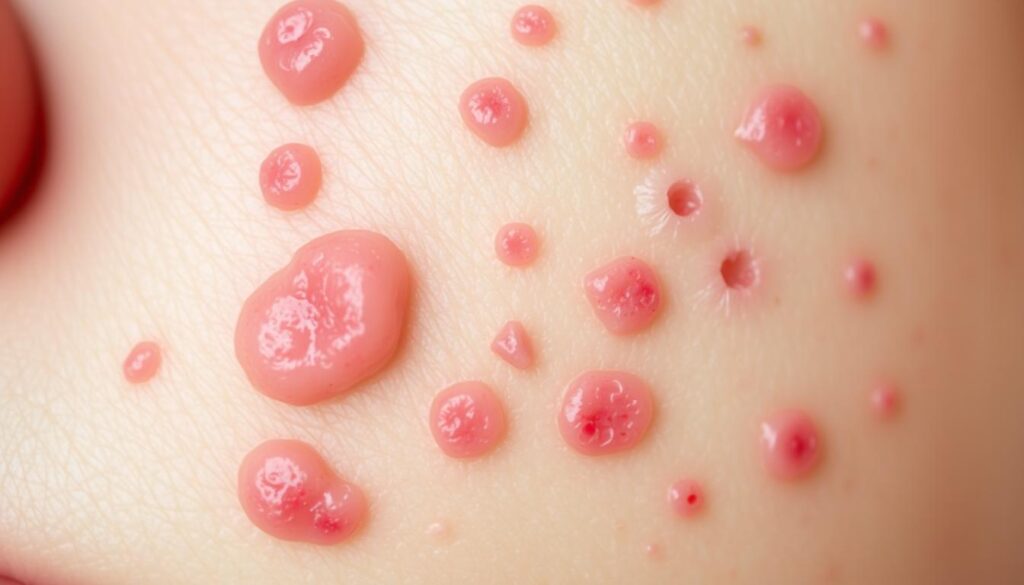Chronic hives can disrupt your daily life with sudden, uncomfortable skin welts. This persistent condition causes significant discomfort and requires effective management1. Understanding this autoimmune skin disorder is key to controlling your symptoms2.
Over 500,000 people in the United States live with chronic urticaria2. The disorder shows up as itchy welts of various sizes and shapes. These hives can interfere with sleep and daily activities1.
Adults between 40 and 59 years old are most affected by chronic hives. Women experience this condition more often than men2. Various factors can trigger hives, including heat, cold, sunlight, and skin pressure1.
Key Takeaways
- Chronic hives affect over 500,000 people in the US
- Symptoms can include itchy, changing welts lasting more than six weeks
- Multiple external and internal factors can trigger hives
- Women are more likely to experience chronic urticaria
- Most cases have an unknown underlying cause
What Are Chronic Hives?
Chronic urticaria causes persistent, itchy rashes on your skin. These mysterious eruptions can disrupt your daily life and cause significant distress3.
Understanding Chronic Hives
Chronic hives are skin reactions with specific features. These rashes are welts that last over six weeks, creating ongoing challenges. They appear, change shape, and vanish quickly4.
Key Characteristics of Chronic Hives
- Welts lasting less than 24 hours per occurrence4
- Potential variations in welt size and color4
- Intense itching and potential swelling4
- Possible triggers including heat, stress, and pressure4
Distinguishing from Acute Hives
Chronic hives are more complex than acute hives. They often stem from immune system responses. Histamine release plays a key role in these skin reactions4.
Chronic hives can be triggered by various factors, making them a challenging condition to diagnose and manage.
Symptoms to Monitor
Watch for persistent skin rashes that:
- Appear and disappear repeatedly
- Cause significant itching
- Create swelling around sensitive areas
- Persist beyond a few weeks
Ongoing symptoms require a doctor’s visit. They can help find the cause and create a treatment plan3.
| Characteristic | Chronic Hives | Acute Hives |
|---|---|---|
| Duration | More than six weeks | Less than six weeks |
| Welt Persistence | Individual welts last less than 24 hours | Typically shorter duration |
| Trigger Identification | Often challenging to identify | More easily traceable |
Understanding chronic hives is the first step toward effective management and relief from these challenging skin reactions.
Causes of Chronic Hives
Chronic hives have complex triggers and mechanisms. Their exact cause remains unknown. Several factors can contribute to these persistent skin conditions.
Common Triggers and Allergens
Hive triggers can come from various sources. Your body might react to environmental factors, physical stimuli, food allergens, or medications.
- Environmental factors like temperature changes
- Physical stimuli such as pressure or vibration
- Specific food allergens
- Medication interactions
One in four people experience hives at some point. Chronic cases last longer than six weeks5. About 20% of people have chronic spontaneous urticaria in their lifetime6.
Role of Stress and Hormones
Emotional and physical stress can affect your skin’s response. Chronic hives often appear during times of increased psychological tension. Hormonal changes may also trigger skin conditions.
Women experience hives twice as often as men6. This suggests a possible link to hormonal fluctuations.
Underlying Health Conditions
Some chronic hives link to broader health issues. These may include autoimmune disorders, thyroid problems, viral infections, or inflammatory responses.
- Autoimmune disorders
- Thyroid dysfunction
- Viral infections
- Inflammatory responses
“Most chronic hives are idiopathic, meaning their precise origin remains unknown,” notes dermatological experts.
For ongoing cases, doctors might suggest advanced antihistamines or specialized treatments. The FDA has approved omalizumab for chronic spontaneous urticaria6.
Always talk to a healthcare professional about your hives. They can help identify triggers and create a management plan.
Treatment Options for Chronic Hives
Managing chronic hives needs a smart plan to ease symptoms and boost life quality. Antihistamines are often the go-to fix for these skin issues. Doctors may up the dose of second-gen H1 antihistamines if needed7.
Your plan might mix different methods. When over-the-counter meds fail, doctors may prescribe montelukast, doxepin, or omalizumab. For severe cases, a short run of corticosteroids can help7.
If hives keep coming back, seeing a specialist is key. This problem affects 20% of people in their lifetime7.
Stress control is crucial for managing chronic hives. Try avoiding triggers, using cold packs, and wearing comfy clothes. Keeping a trigger diary can help doctors make a better plan8.
A full treatment approach often includes tracking what sets off your hives. This info helps your healthcare team create a targeted strategy8.
If hives keep bothering you, talk to a skin or allergy doctor. Most chronic hive cases have no known cause. Expert help is key to finding what works for you7.
FAQ
What exactly are chronic hives?
How do chronic hives differ from acute hives?
What are the common triggers for chronic hives?
Are there effective treatments for chronic hives?
When should I see a doctor about my hives?
Can stress really cause chronic hives?
Are chronic hives a sign of a more serious condition?
Source Links
- Chronic hives – Symptoms and causes – https://www.mayoclinic.org/diseases-conditions/chronic-hives/symptoms-causes/syc-20352719
- What is Chronic Urticaria? – Allergy & Asthma Network – https://allergyasthmanetwork.org/chronic-urticaria/
- Hives (Chronic Urticaria) Program – https://www.massgeneral.org/medicine/allergy/treatments-and-services/hives
- Chronic hives – https://www.uofmhealthsparrow.org/departments-conditions/conditions/chronic-hives
- Acute Hives versus Chronic Hives – https://www.aaaai.org/tools-for-the-public/conditions-library/allergies/acute-hives-versus-chronic-hives
- Chronic Spontaneous/Idiopathic Urticaria (Chronic Hives) – https://acaai.org/allergies/allergic-conditions/skin-allergy/chronic-hives/
- Acute and Chronic Urticaria: Evaluation and Treatment – https://www.aafp.org/pubs/afp/issues/2017/0601/p717.html
- Chronic Urticaria Management & Resources – Allergy & Asthma Network – https://allergyasthmanetwork.org/chronic-urticaria/management-and-resources/
